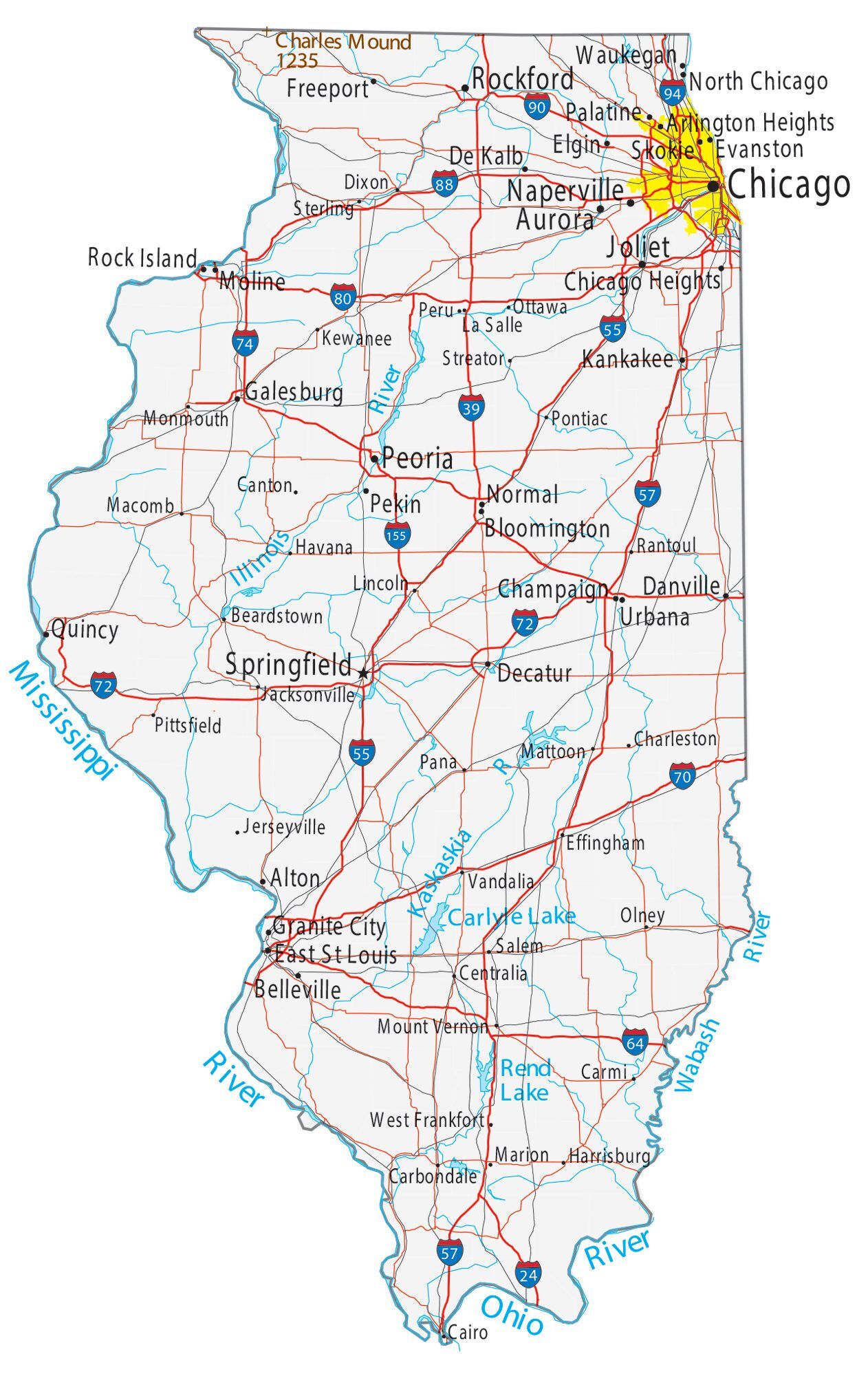Understanding the Illinois septic regulations is crucial for homeowners and businesses. Knowing the rules about installation permits, wastewater disposal, maintenance, and compliance helps prevent costly mistakes. This guide will cover everything you need to know about Illinois septic permits, tank placement, wastewater management, and more.
- State-Specific Regulations Information
- Compliance Information
- Cost Information
- Local Resources & Contact Information
- Supportive Resources
- FAQs Illinois Septic Permits
State-Specific Regulations Information
Installation Permits
If you want to install a septic system in Illinois, obtaining the right permit is necessary. Yes, Illinois requires a permit for the installation of any septic system. The Illinois Health Department oversees these regulations to ensure that all installations meet environmental and safety guidelines.
The cost of an Illinois septic permit varies. Typically, permit fees range from $300 to $1,000, depending on the size and type of system. It’s advisable to check with your local health department or environmental protection agency for precise costs. Permits ensure that your system follows state requirements and prevents issues that could arise from improper installations.
The application process involves submitting an application to your local health department or environmental protection office. You’ll need to provide details about the property, system size, and design plans. This ensures that your installation meets Illinois wastewater management regulations and state guidelines.
Septic Tank Size and Placement
Illinois has specific guidelines about tank sizing and drain field placement to protect the environment and groundwater. The Illinois Health Department provides clear recommendations for residential and commercial properties.
For residential properties, the recommended tank size usually ranges between 1,000 and 1,500 gallons, depending on the household size. Larger households may need bigger tanks to handle wastewater efficiently. Placement guidelines are designed to minimize risks to the soil and water supply. Tanks should be placed at least 10 feet away from structures and 20 feet away from water sources, such as wells or lakes.
Drain field placement must follow strict regulations to ensure proper absorption and filtration. Proper placement helps prevent groundwater contamination and protects public health. Consulting with a certified septic professional in Illinois will ensure compliance with these guidelines.
Wastewater Disposal
Illinois wastewater disposal rules aim to protect the environment and public health. The Illinois wastewater management regulations set standards for how wastewater should be treated and disposed of.
Residential and commercial properties must follow guidelines provided by the Illinois Health Department. Wastewater should be properly filtered through the septic system before being released into the environment. Disposal methods include drain fields, sand filters, or aeration systems.
If you discharge wastewater improperly, it can contaminate soil and water resources. This could result in significant environmental damage and health hazards. Adhering to Illinois wastewater disposal regulations ensures that your system functions effectively and environmentally responsibly.
Maintenance and Pumping
Regular maintenance and pumping are crucial to extend the lifespan of your septic system and comply with Illinois health department guidelines. The recommended schedule for pumping depends on your household size and system use.
For most households, it’s recommended to have your septic tank pumped every 3 to 5 years. Regular pumping removes solids from the tank, preventing backups and costly repairs. The Illinois Health Department also encourages periodic inspections to identify and address potential issues early.
Routine maintenance includes checking for leaks, inspecting drain fields, and ensuring that all parts of the system are functioning properly. A certified septic professional in Illinois can conduct thorough inspections and provide maintenance services to meet state requirements.
Compliance Information
Potential Fines and Penalties
If you don’t follow Illinois septic regulations, you may face fines and penalties. The Illinois Environmental Protection Agency and local health departments enforce these regulations. Fines can range from $500 to $5,000, depending on the severity of the violation.
Common violations include failing to obtain proper installation permits, discharging wastewater improperly, and neglecting maintenance schedules. Ignoring these requirements can result in system failure, health hazards, and environmental damage.
Penalties are in place to protect public health and the environment. Compliance with Illinois septic regulations ensures that your system operates effectively and follows state and local guidelines.
Environmental Protections in Illinois
Illinois has strict environmental protections to safeguard soil, water, and air quality. The state prioritizes wastewater management regulations that focus on minimizing environmental contamination.
The Illinois Health Department’s guidelines ensure that all wastewater disposal and septic installations adhere to eco-friendly practices. Septic systems must be designed and maintained to prevent contaminants from reaching groundwater sources.
Compliance with environmental regulations protects both residential areas and natural resources. Adhering to these protections helps maintain clean soil and water, ensuring long-term sustainability for communities across Illinois.
Cost Information
Typical Costs for Septic Services in Illinois
Understanding the costs associated with septic services helps you budget for installation, maintenance, and compliance. Here’s a breakdown of typical costs:
Permit Fees
Permit fees for an Illinois septic system installation typically range from $300 to $1,000. The exact cost depends on your local health department’s guidelines and system size.
Pumping Costs
Regular pumping is an essential part of maintaining your septic system. In Illinois, septic pumping costs usually range from $300 to $500. The frequency of pumping depends on household size and system usage.
Installation Estimates
Installing a new septic system in Illinois can be costly. Installation estimates generally range from $5,000 to $10,000. The cost depends on system size, type, and installation complexity. It’s best to get multiple estimates from certified local septic service providers to compare costs and services.
Local Resources & Contact Information
State Agencies Responsible for Septic Systems
The Illinois Environmental Protection Agency oversees the compliance and management of septic systems. Additionally, the Illinois Health Department sets guidelines for proper installation, wastewater disposal, and system maintenance. These agencies work to ensure that all septic systems meet state regulations.
Local Health Departments and Environmental Protection Agencies
Each county in Illinois has a local health department responsible for overseeing septic system installations and compliance. You can contact these departments for permit applications, inspections, and guidelines.
Visit your local health department’s website or call their office to get accurate information about permits, inspections, and compliance requirements.
Contact Information for Septic Service Providers in Illinois
Numerous certified septic service companies operate throughout Illinois. These professionals handle installations, inspections, pumping, and maintenance services. It’s important to hire state-certified service providers to ensure compliance with Illinois health department guidelines.
Look for local directories or consult websites dedicated to certified septic professionals. Reviews and testimonials can help you choose a reliable company for your septic needs.
Supportive Resources
Government Health Departments & Environmental Agencies
The Illinois Health Department provides extensive resources on septic system installation, maintenance, and wastewater disposal. Their website includes downloadable guides and infographics for homeowners and professionals.
The Illinois Environmental Protection Agency also offers guidelines and resources to support compliance with wastewater management regulations.
Certified Septic Service Providers
There are many trusted websites showcasing state-certified septic service providers. These platforms offer contact details, reviews, and service information. Choosing a reliable service ensures proper installation, maintenance, and adherence to state regulations.
Guides & Educational Resources
Illinois offers downloadable handbooks and infographics about septic system maintenance and wastewater management. These resources are designed to educate homeowners, businesses, and professionals about best practices and compliance with state regulations.
FAQs Illinois Septic Permits
Do I need a permit to install a septic system in Illinois?
A: Yes, installing a septic system in Illinois requires a permit from your local health department. Permit fees typically range from $300 to $1,000. Permits ensure your system meets Illinois Health Department guidelines and state wastewater management regulations. For more details, visit the Illinois Environmental Protection Agency website.
How often should I pump my septic tank in Illinois?
A: In Illinois, it’s generally recommended to pump your septic tank every 3 to 5 years, depending on household size and system usage. Proper pumping helps prevent system backups and costly repairs. For comprehensive maintenance schedules and tips, refer to the Illinois Health Department guidelines.
What happens if I don’t follow Illinois septic regulations?
A: Failure to comply with Illinois septic regulations can result in fines ranging from $500 to $5,000, system failures, and environmental contamination. Violations may include improper wastewater disposal, unpermitted installations, and neglecting required inspections. To understand more about penalties and regulations, check out the Illinois Environmental Protection Agency.
What are Illinois wastewater disposal rules?
A: The Illinois wastewater disposal guidelines require wastewater to be treated and disposed of through your septic system in an environmentally responsible manner. This includes proper absorption in drain fields, sand filters, and aeration systems. Check out the Illinois Environmental Protection Agency to understand specific wastewater disposal rules.
How can I find a certified septic service provider in Illinois?
A: You can find certified septic service companies by contacting your local health department or using online directories that list state-certified professionals. Websites like the National Onsite Wastewater Recycling Association (NOWRA) also help you locate reputable septic service providers in Illinois.
What are the typical costs for septic system installation in Illinois?
A: Installing a new septic system in Illinois usually costs between $5,000 and $10,000, depending on system size and type. Costs include materials, labor, permits, and site preparation. For accurate estimates and information, visit the Illinois Department of Public Health.
What environmental protections exist for septic systems in Illinois?
A: Illinois has stringent environmental protections to prevent soil and water contamination. The Illinois Environmental Protection Agency enforces regulations ensuring proper system installation, wastewater disposal, and long-term maintenance. For more specific regulations and eco-friendly guidelines, visit Illinois EPA’s official site.
Can I handle septic system maintenance on my own in Illinois?
A: While basic maintenance tasks like cleaning vents or inspecting inlet/outlet pipes can be done by homeowners, comprehensive tasks like pumping, inspections, and system repairs should be handled by certified septic service providers. Hiring professionals ensures adherence to Illinois Health Department regulations and prolongs the system’s lifespan. You can find local experts on the National Onsite Wastewater Recycling Association.
How do I get information about septic regulations specific to my county in Illinois?
A: Septic regulations can vary by county. Contact your local health department or environmental protection office, as they are responsible for county-level compliance with septic guidelines. A good starting point is the Illinois Department of Public Health.
Are there downloadable guides or resources about septic regulations in Illinois?
A: Yes, the Illinois Health Department and Environmental Protection Agency offer downloadable guides, handbooks, and infographics. These resources cover installation, maintenance, wastewater disposal, and compliance requirements. Visit the Illinois Department of Public Health and Illinois EPA for access to these resources.
What are the penalties for wastewater disposal violations in Illinois?
A: Violating wastewater disposal regulations in Illinois can result in severe penalties, including fines from $500 to $5,000, system decommissioning, and legal actions. These penalties ensure compliance with state wastewater disposal and environmental protection regulations. For more comprehensive details on compliance guidelines, visit the Illinois EPA.
DIY Repairs Are Always Cheaper
Septic Regulations in Rural Areas: Essential Guide for Rural Property Owners
The Role of Perforated Pipes in Drain Fields
What Happens During a Pumping Service?
Septic Tanks vs. Sewer Systems | Choosing the Right Option
Directory | Virginia Septic Service Providers | Part 2







